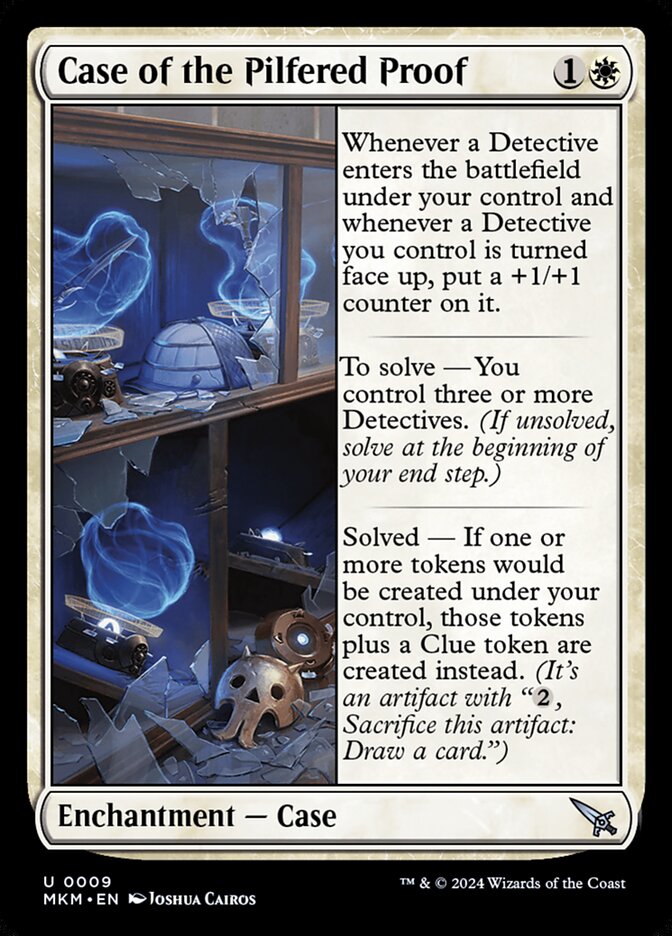
Case of the Pilfered Proof {1}{W}
Enchantment — Case
Whenever a Detective enters the battlefield under your control and whenever a Detective you control is turned face up, put a +1/+1 counter on it.
To solve — You control three or more Detectives. (If unsolved, solve at the beginning of your end step.)
Solved — If one or more tokens would be created under your control, those tokens plus a Clue token are created instead. (It’s an artifact with “{2}, Sacrifice this artifact: Draw a card.”)
Illustrated by Joshua Cairos
- Standard
- Legal
- Alchemy
- Legal
- Pioneer
- Legal
- Explorer
- Legal
- Modern
- Legal
- Historic
- Legal
- Legacy
- Legal
- Brawl
- Legal
- Vintage
- Legal
- Timeless
- Legal
- Commander
- Legal
- Pauper
- Not Legal
- Oathbreaker
- Legal
- Penny
- Legal
| Faces, Tokens, & Other Parts |
|---|
| Clue Token, TMKM #18 |
| Case of the Pilfered Proof, MKM #9 |
| Prints | USD | EUR | TIX |
|---|---|---|---|
| Murders at Karlov Manor | $0.03 | €0.05 | 0.02 |
Toolbox
Buy This Card
Notes and Rules Information for Case of the Pilfered Proof:
- Each Case has two special keyword abilities: to solve and solved. (2024-02-02)
- “To Solve — [condition]” means “At the beginning of your end step, if [condition] and this Case is not solved, it becomes solved.” (2024-02-02)
- The meaning of “solved” differs based on what type of ability follows it. “Solved — [activated ability]” means “[Activated ability]. Activate only if this Case is solved.” Activated abilities contain a colon. They’re generally written “[Cost]: [Effect].” (2024-02-02)
- “Solved — [Triggered ability]” means “[Triggered ability]. This ability triggers only if this Case is solved.” Triggered abilities use the word “when,” “whenever,” or “at.” They’re often written as “[Trigger condition], [effect].” (2024-02-02)
- “Solved — [static ability]” means “As long as this Case is solved, [static ability].” Static abilities are written as statements, such as “Creatures you control get +1/+1” or “Instant and sorcery spells you cast cost {1} less to cast.” (2024-02-02)
- “To solve” abilities will check for their condition twice: once when the ability would trigger, and once when it resolves. If the condition isn’t true at the beginning of your end step, the ability won’t trigger at all. If the condition isn’t true when the ability resolves, the Case won’t become solved. (2024-02-02)
- Once a Case becomes solved, it stays solved until it leaves the battlefield. (2024-02-02)
- Cases don’t lose their other abilities when they become solved. (2024-02-02)
- Being solved is not part of a permanent’s copiable values. A permanent that becomes a copy of a solved Case is not solved. A solved Case that somehow becomes a copy of a different Case stays solved. (2024-02-02)
- Clue is an artifact type. Even though it appears on some cards with other permanent types, it’s never a creature type, a land type, or anything but an artifact type. (2024-02-02)
- If an effect refers to a Clue, it means any Clue artifact, not just a Clue artifact token. For example, you can sacrifice Wrench to pay for Alquist Proft, Master Sleuth’s activated ability. (2024-02-02)
- You can’t sacrifice a Clue to pay multiple costs. For example, you can’t sacrifice a Clue token to activate its own ability and also to activate Alquist Proft, Master Sleuth’s ability. (2024-02-02)
- Some spells and abilities that investigate may require targets. If each target chosen is an illegal target as that spell or ability tries to resolve, it won’t resolve. You won’t create any Clue tokens. (2024-02-02)
- Some abilities trigger “whenever you sacrifice a Clue”. Those abilities trigger whenever you sacrifice a Clue for any reason, not just to activate a Clue’s activated ability. (2024-02-02)